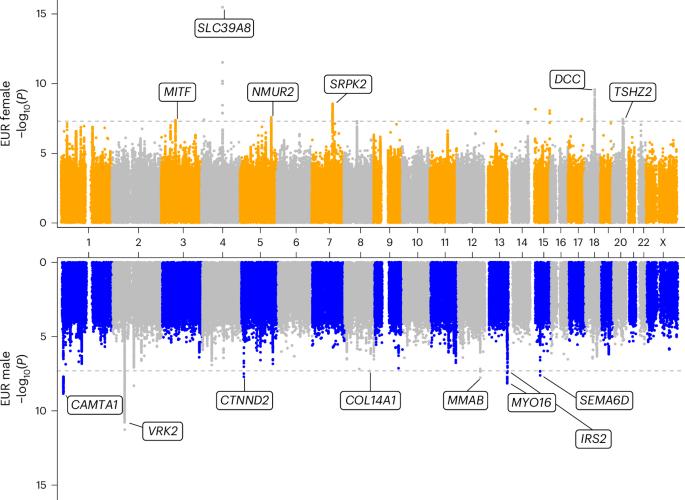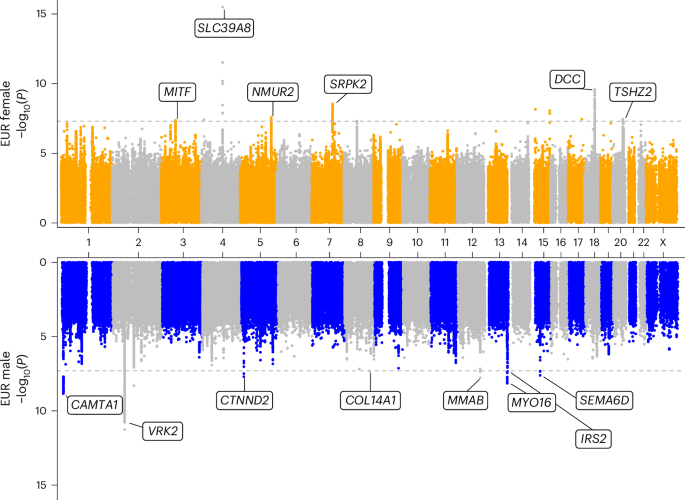口吃的大规模基因组分析
IF 29
1区 生物学
Q1 GENETICS & HEREDITY
引用次数: 0
摘要
发展性口吃是一种高度遗传性的、常见的语言状况,其特征是言语的延长、障碍和重复。虽然口吃是高度可遗传的,并且在家庭中丰富,但遗传结构在很大程度上没有得到充分的研究。我们推断,在性别和祖先群体中,有共同的和不同的遗传变异影响口吃风险。为了验证这一观点,我们对自我报告的口吃进行了八次主要的全基因组关联分析,这些分析按性别和血统分层,并对100多万人(99,776例和1,023,243例对照)进行了二次荟萃分析,确定了57个独特的位点。我们在两个独立的数据集中验证了自我报告的口吃的遗传风险。我们进一步展示了口吃与自闭症、抑郁症和音乐节奏受损的遗传相似性,并通过后续分析强调了这些特征之间潜在的因果关系。我们的发现为口吃的遗传因素提供了强有力的见解。本文章由计算机程序翻译,如有差异,请以英文原文为准。


Large-scale genome-wide analyses of stuttering
Developmental stuttering is a highly heritable, common speech condition characterized by prolongations, blocks and repetitions of speech. Although stuttering is highly heritable and enriched within families, the genetic architecture is largely understudied. We reasoned that there are both shared and distinct genetic variants impacting stuttering risk within sex and ancestry groups. To test this idea, we performed eight primary genome-wide association analyses of self-reported stuttering that were stratified by sex and ancestry, as well as secondary meta-analyses of more than one million individuals (99,776 cases and 1,023,243 controls), identifying 57 unique loci. We validated the genetic risk of self-reported stuttering in two independent datasets. We further show genetic similarity of stuttering with autism, depression and impaired musical rhythm across sexes, with follow-up analyses highlighting potentially causal relationships among these traits. Our findings provide well-powered insights into genetic factors underlying stuttering. Genome-wide analyses in over one million self-reported cases and controls identify genetic variants associated with stuttering and find genetic correlations with autism, depression and impaired musical rhythm, supporting a potential neurological basis for stuttering.
求助全文
通过发布文献求助,成功后即可免费获取论文全文。
去求助
来源期刊

Nature genetics
生物-遗传学
CiteScore
43.00
自引率
2.60%
发文量
241
审稿时长
3 months
期刊介绍:
Nature Genetics publishes the very highest quality research in genetics. It encompasses genetic and functional genomic studies on human and plant traits and on other model organisms. Current emphasis is on the genetic basis for common and complex diseases and on the functional mechanism, architecture and evolution of gene networks, studied by experimental perturbation.
Integrative genetic topics comprise, but are not limited to:
-Genes in the pathology of human disease
-Molecular analysis of simple and complex genetic traits
-Cancer genetics
-Agricultural genomics
-Developmental genetics
-Regulatory variation in gene expression
-Strategies and technologies for extracting function from genomic data
-Pharmacological genomics
-Genome evolution
 求助内容:
求助内容: 应助结果提醒方式:
应助结果提醒方式:


